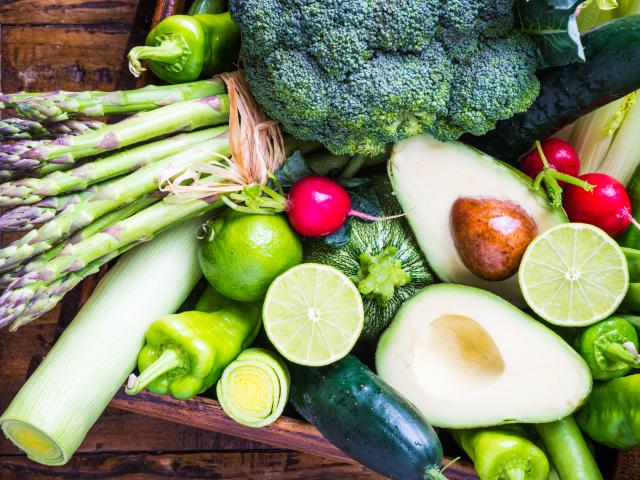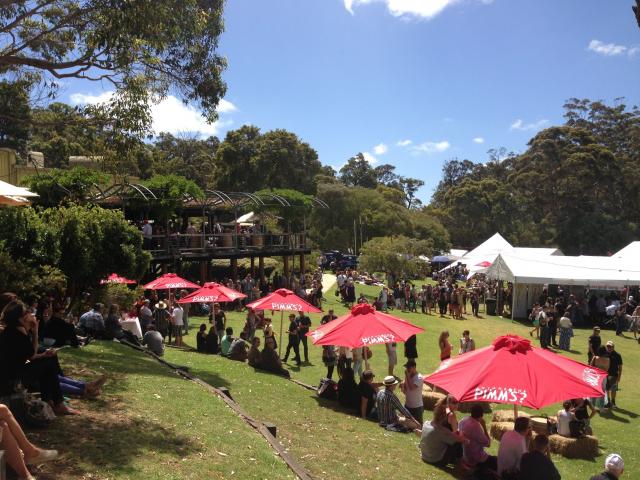Food Industry Innovation marching forward in 2017
Welcome to the third Food Industry Innovation (FII) project newsletter, made possible by Royalties for Regions investment.
In this edition, we share global food and beverage commentator Professor David Hughes’ thought-provoking insights on the changing face of our food future. The Department of Agriculture and Food, Western Australia's (DAFWA) FII project was delighted to host the dynamic, London-based professor in Manjimup and Mandurah to full audiences earlier this month. Our thanks to Peel Development Commission for their partnership in hosting the breakfast seminar at Mandurah Quay Resort.
Also in this newsletter, WA producer Jennie Franceschi from Fresh Produce Alliance shares the motivation behind starting her business, plus the opportunities and barriers she has faced since expanding into Asian and Middle Eastern export markets. Her mission to minimise waste, find new export markets and support farming families is an inspiring read.
We also introduce you to FII team member, Specialised Food Centre manager Nikki Poulish. Nikki’s passion for agriculture and networks in the Great Southern region make her a valued member of the project team.
Stakeholder engagement, agribusiness collaboration and knowledge sharing have been key activities for the project team in these first few months of the year, as reflected in the Western Australian Premium Food Centre update.
The Premium Agrifood Market Opportunity (PMO) report commissioned by the FII project, was recently completed by market research consultancy Coriolis. Its findings will soon be made available to the public.
The FII project will host a free five-day Plan, Prepare, Prosper food workshop in Albany in May. This program is designed to strengthen and sustain agrifood businesses through completion of a strategic business plan, improve business skills to manage and thrive in the future, and provide an understanding of how other producers are managing their challenges. For more information or to register, phone Kaylene Parker on +61 (0)8 9892 8444, +61 (0)413 856 515 or email: foodindustryinnovation@agric.wa.gov.au
We hope you enjoy this edition and if you have any feedback on the newsletter, we’d love to hear from you at foodindustryinnovation@agric.wa.gov.au
Global food trends with Professor David Hughes
All hail flexitarians who want convenient meals with fewer ingredients that provide health benefits, are high in protein, free range and mostly plant-based. This is the changing face of our food future according to international food and beverage commentator Professor David Hughes, who spoke at three seminars hosted by DAFWA in early March.
A key focus of the Food Industry Innovation project is to help WA producers understand global food trends and find new market opportunities.
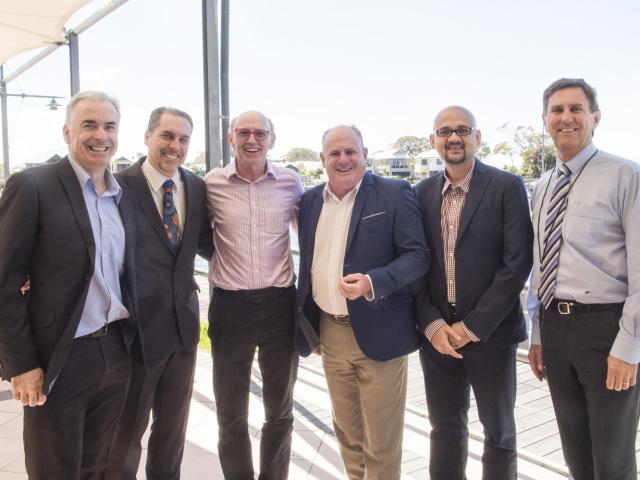
Professor Hughes’ most recent visit to WA provided timely, relevant insights on food production, packaging and consumption, and on how global consumer and retail trends might affect local businesses and industry. He described these new consumers as time-poor, tech-savvy and socially engaged. For them, “Big Food” like McDonalds, Kelloggs and Coca Cola are out, and smaller artisanal producers with short supply chains are in.
Otherwise known as 'Dr Food' by his blog followers, Professor Hughes is Emeritus Professor of Food Marketing at Imperial College London and an advisor on international food organisation boards, who travels the world consulting to businesses, trade associations and governments. His key message was the global demand for food products with “few, simple, natural ingredients” - a great positive for farmers worldwide.
Global ingredient trends included: products with pronounceable names, natural, traceable, lightly processed and all printed on clear labels. He said buyers wanted shorter, transparent supply chains with provenance and interesting stories about the producers. They also wanted their meat free range and free of additives, with more plant-based protein added to their plates to broaden their healthy eating regimes.
Professor Hughes said traditional meat companies were now having to explain protein much further. He used examples of pea protein cheeseburgers, the Quorn brand of non-meat sausages, TerraVia's algal protein and Mars and Snickers using “protein bars” in their product marketing. Even insects are being farmed for protein (crickets and maggots) for intensive feeding of livestock to target the trend.
Other global trends for food and beverage: buyers want convenience, healthy snack products, more natural fruit/veg drinks and “freshly frozen” such as smoothies. There was also demand for specialty food ingredients such as high fibre, Omega-3 canola, low gluten or gluten-free.
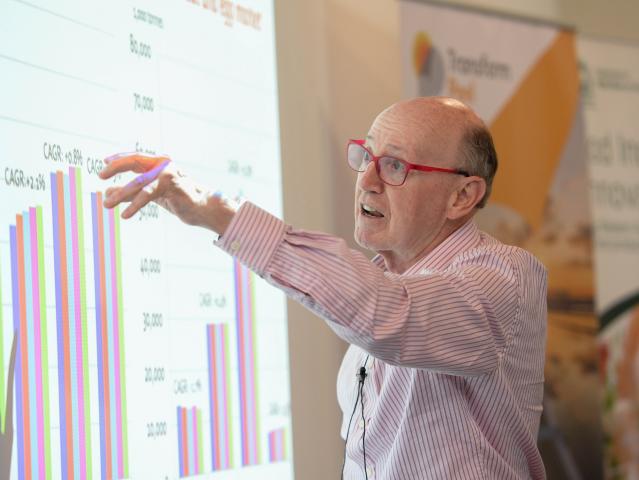
A more recent global trend is the rise of flexitarianism - a part-time fruit/vegetarian who eats some quality meat, nuts, beans and ancient grains. Also popular is natural processing such as cold high pressure processing (HPP), and creating a “real” link with producers.
In Asia there are four broad classes of product in demand: raw materials for their own farms and factories, distinctive products Asia does not produce such as Atlantic salmon and rock lobster, counter-seasonal produce such as kiwi fruit and avocados, and status products including wine, chocolate bars and infant formula.
In China particularly, there is real value placed on imported foods that have a built-in gift appeal. More than 50% of gifts given in China are food, but the food safety and supply chain integrity is vital for those products.
It was important for WA businesses to also understand that Asian consumers did not differ from “westerners” on trends relating to ingredients in their food products. Asian consumers also want to recognise ingredients on the label, a short and simple list, natural ingredients, no artificial ingredients and low fat/sugar/salt. They are more aware of the health attributes of food and have simmering concerns about food safety aspects.
There are significant differences however, in consumers’ preferences between countries and cultures. Understanding customer needs and wants is essential for WA producers who are looking to export their product internationally. Whereas chicken breast meat is highly desirable for many Australian consumers, it is not the meat of choice in many Asian markets and is actually exported for use in cat food. In Asian markets there is a strong preference for chicken wings which is reflected in the higher price compared to chicken breast.
Professor Hughes noted WA had huge opportunities for growth, but also huge challenges in terms of accessing global markets and being competitive against bigger brands.
“There needs to be a collective vision for opportunities to become a reality in WA, an environment where there are food clusters and people work together and compete simultaneously,” he said.
One of the three DAFWA sponsored Professor Hughes’ seminars was hosted by the Peel Development Commission. The Peel event was co-presented by Associate Professor Christopher Vas from Murdoch University’s Singapore Centre for Research in Innovation, Productivity and Technology. Associate Professor Vas spoke on agrifood security trends and the advancement of Smart Urban Farms such as vertical farms and plant factories in Asia, and how WA needed to invest in this technology.
“We can't afford not to do technology if we want to be competitive,” Associate Professor Vas said. “The value-add has to start happening. Opportunities are there and we need to take advantage of them. Urban farms will only add more support systems to traditional farming.”
Better understanding the demands of Asia is a key report produced by DAFWA late last year - the Target Market Opportunities in Asia report. This report confirms there are exciting, high growth, high value premium opportunities for WA producers that have the potential to deliver an estimated $1.3 billion per year in incremental, new export revenue to WA in the next five to seven years.
Dr Hughes said when talking premium food products the margin was in the adjectives: "You've got to be into adjectives"
| Organic | Expensive packaging |
| Small batch | Protected name |
| Ethical | Named producer |
| Artisan | Secret/family recipe |
| Fair trade | Rich/distinct flavour |
| Locally produced | Free range |
| Picturesque source | Grass fed |
| Rare/limited supply | Family owned |
| Cave/barrel aged | Award winning |
| Estate grown | Celebrity endorsed |
| Sustainable | Promoted and advertised |
| Heirloom/rare breed | Expensive ingredients |
(Source: Coriolis research for DAFWA, 2016)
Profile: Jennie Franceschi, Fresh Produce Alliance
Finding a solution for “ugly produce” has spurned a new generation of farming for Fresh Produce Alliance (FPA). This company started from the simple dilemma of what to do with the vast amount of perfectly fresh and edible (but unmarketable) fruit and vegetables being discarded.
The group sought innovative technologies that could utilise this once discarded produce including a High Pressure Processing (HPP) machine and BOC Instant Quick Freeze (BOC IQF) machine.
Fresh Produce Alliance spokesperson Jennie Franceschi said not only did they want to find a solution for the amount of waste they had, but also create healthy, delicious food options for consumers and find greater export market opportunities that would ultimately provide a more sustainable future for farmers.
“Our mission is to champion a sustainable agricultural ecosystem for future generations by connecting responsible agricultural production with innovative technology to produce naturally healthy, delicious, real foods people love,” she said.
“Our delicious creations are available for both domestic and export markets along with supplying bulk fresh frozen and pre-packed fruit and vegetables to food service wholesalers.”
Operating in the Fast Moving Consumer Goods (FMCG) sector means you have to think outside the box to maintain profitability.
Fresh Produce Alliance created three value-add avenues to expand their business including Born Pure (baby food), Avovita (avocado products) and Truu (juices).
Their market focus for these products was to create healthy, preservative-free, additive-free and allergen-free vegan foods for both Australian and Asian export markets.
Using the HPP and BOC IQF machines allows Fresh Produce Alliance to use the “ugly produce” and deliver it in a way that provides a safe and healthy product for consumers.
“I believe HPP is the technology of the future because it maintains nutritional integrity, flavour and colour without the use of preservatives,” Jennie said.
“Having taken our products into Singapore, Dubai and Japan, I can say we have had some really great feedback and have many countries wanting to stock our products. We are currently going through the process of ticking off all the requirements for market access, so some work in labelling, custom clearance and approvals needs to happen. Once we have done all this, then I expect our products will be found in many Asian countries but to targeted high-end customers. We are not quite ready for mainstream Asia and we still need to sort their cool change management issues to work out where we will or won’t go.”
Jennie said the biggest barrier for their operation was the ability to invest in additional capital to scale up their operations. However, they are always prepared to collaborate across other industries and within their own.
“We collaborate with people to see if we can come up with industry solutions that are sustainable and mutually beneficial,” she said.
In the future, FPA will continue to build and develop products that can be exported and work with farmers to get better programmed supply.
Western Australian Premium Food Centre update
The Western Australian Premium Food Centre (WAPFC) team has been busy working on several exciting project opportunities and attending key conferences and events over the past four months that are helping shape the direction of the centre.
The team continues to engage with local, domestic and international agrifood stakeholders. WAPFC manager Phil May was invited to speak at the Australia-China Conference on Science, Technology and Innovation in early February. His presentation covered opportunities and challenges for WA’s premium agrifood sector, with a focus on Asian export markets.
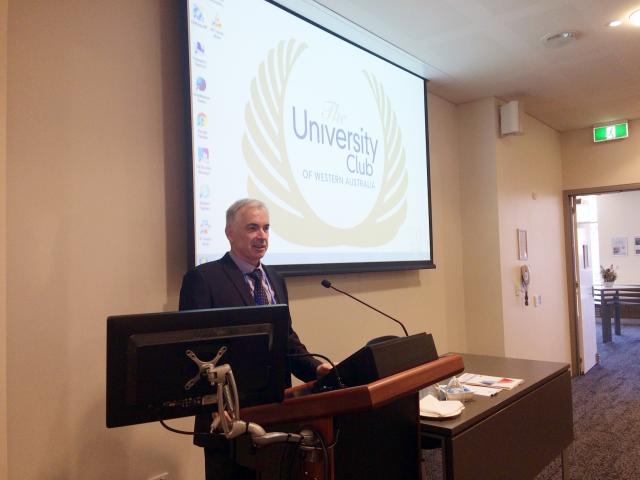
The FII project was also represented at Gourmet Escape where Phil was able to engage with growers and premium food businesses at the Gourmet Village stalls. “I chatted and met with many people who will become important to the WAPFC from a networking point of view,” he said.
Although Phil was able to see the effervescent Nigella Lawson live on stage as part of Gourmet Escape he wasn’t able to get close enough for a photo. Maybe another time Phil!
During the lead up to the event Phil was also able to engage with a Singapore-Malaysian delegation of chefs and journalists, invited to Western Australia by Tourism WA, to attend Gourmet Escape. The delegation visited the Swan Valley, Great Southern, Southern Forests and Margaret River regions and the WAPFC was able to meet with them on several occasions including a dinner hosted by the Southern Forest Food Council, at a site inspection of Fresh Produce Alliance and at the Gourmet Escape event itself. Phil said from discussions with the Malaysian and Singaporean delegates, it was confirmed that WA offered benefits to those countries primarily based on food quality and safety.
A delegation from Gascoyne Development Commission (GDC) visited the WAPFC in Manjimup, where Phil was able to discuss the strong alignments between what GDC is trying to implement within their region to what the Food Industry Innovation project is trying to achieve, which is value adding to raw material.
Part of GDC’s due diligence was to visit the WAPFC office to understand which businesses were already working in the value-add space and the commitment needed in terms of personnel. A team highlight was inspecting the Fresh Produce Alliance (FPA) facilities in Manjimup. The delegation met with managers Wayne and Jennie Franceschi and had the opportunity to taste some of their wonderful products.
The possibility of replicating FPA’s successes in HPP and value-add products was discussed for other parts of WA. A take-home message for GDC was confirmation about the high level of investment in infrastructure and personnel required.
“Since their visit I have been involved in subsequent meetings with GDC, Gascoyne Food Council, Sweeter Banana and Curtin University because they have an ongoing interest in developing a facility that can result in value-add agrifoods from the Gascoyne,” Phil said.
Phil also travelled to South Australia to meet with Department of Primary Industries and Regions South Australia (PIRSA), industry bodies and business leaders. He said it was a highly productive trip aimed at establishing mutually beneficial working relationships and shared learnings.
“South Australia and WA have similarities in our agrifood markets, we are both looking to increase value-add opportunities, we both have grain dominant agricultural industries and the challenges we face are quite similar,” he said.
“Both states seek to export more, both need to value add, and we are both trying to grow local markets where we compete within and between states to then enter an international market competing against well-established global brands. We share the skill development requirements associated with becoming competitive in the global arena. What we are looking at is where we can more efficiently align resources with South Australia to achieve desired outcomes.”
The WAPFC was also represented at the RSM Timber Towns Wine Show in Manjimup to witness Peos Estate’s 2014 Shiraz take out the coveted Wine of the Show and Silkwood Wines win Most Successful Exhibitor.
The Premium Agrifood Market Opportunity (PMO) report, commissioned by DAFWA’s Food Industry Innovation project, was completed by Coriolis in December last year. As the report is yet to be presented to the Minister for Agriculture and Food WA, it cannot be shared at this time. Once the report release process has been completed, access will be provided to the public.
For more information about any of these updates, please email FoodIndustryInnovation@agric.wa.gov.au or phone +61 (0)8 9777 0162.
Meet the team: Specialised Food Centre manager Nikki Poulish
A lifelong love of regional Western Australia and a passion for agriculture has shaped the life and career of Specialised Food Centre manager Nikki Poulish. Nikki has worked in agriculture for 23 years, more than 20 of those with DAFWA, based in the Great Southern region in Jerramungup, Mt Barker and Albany.
After gaining a Bachelor of Science degree at Murdoch University, she furthered her learning with postgraduate studies in Rural Communications. Nikki has since worked extensively in farming systems.
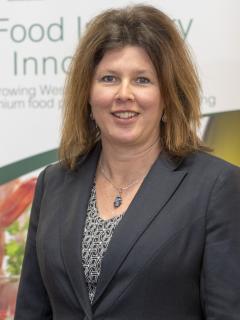
“I got into agriculture from the roots up,” Nikki said. “I started with research on rhizobium and nitrogen fixation in pasture legumes, then went into pastures, grazing systems, livestock, cropping systems, floriculture, diversification, farming systems and agricultural education.”
Nikki also managed WoolPro southern region then the TopCrop WA State team between 2001-2003.
WoolPro and TopCrop were programs that focused on supporting grower groups (and schools) to undertake current best practice farming. These methods were showcased by sharing experiences through group meetings, and running trials or demonstrations on growers’ properties to demonstrate what impact a changed management practice would have on production per hectare.
It was Nikki’s passion for regional communities and community building, through volunteer work, which saw her undertake an AusAid project in Vietnam in 2003. There, she investigated the supply chain of the domestic cut flower industry to look for opportunities that might lead to an export market for local farmers and improve their longer-term viability.
For five years Nikki worked on an Education Initiative project for DAFWA between 2011-2015.
The initiative was to work with teachers, agricultural high schools and colleges to ensure current practice and latest technologies were being taught in the curriculum and to encourage students into agriculture as a career.
They also worked with primary schools to ensure ‘agricultural literacy’ was increased, exposing younger children to agricultural concepts and knowing where and how their food and fibre was produced.
Nikki says now that she is working for the Specialised Food Centre she sees exciting opportunities for farmers and processors in the WA Wheatbelt and Great Southern regions.
“The Specialised Food Centre is a new challenge for me but having strong networks in the Great Southern make it a perfect fit,” she said.
“We’ve had a great start to this project with successful collaborations formed with Regional Development Australia and South Coast Natural Resource Management, Great Southern Development Commission, Lower Great Southern Economic Alliance (City of Albany, Shire of Plantagenet and Shire of Denmark), Shire of Gnowangerup, Shire of Cranbrook, Shire of Broomehill-Tambellup, Gillamii Centre, North Stirlings Pallinup Natural Resources, Albany commercial horticulturalists and the Great Southern Food Network.”

